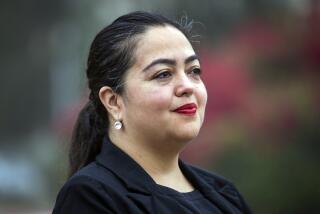A Victim’s Sobering Perspective
- Share via
For years, when reporters in Orange County have wanted to talk about drunk drivers for a story, we’ve often called Reidel Post of Anaheim. That’s because she’s executive director of the local chapter of Mothers Against Drunk Driving (MADD).
But Post isn’t just a bureaucrat who latched onto the position because she’s a good administrator. She can identify with drunk driving victims because she is one.
Her decision to jump into the cause came during months of lying in a hospital bed after an auto crash 10 years ago. Her right foot was shattered, as well as her life.
Post was heading down Carbon Canyon’s winding road to the bank and then to pick up her children at school. A drunk driver crossed the center lane and his vehicle hit hers head-on.
Drunk driving had touched her life before. The twin sister of her former husband had been killed by a driver who’d had too much to drink.
“I’d always said I wanted to devote time to a cause,” Post reflected. “I’m so sorry I waited until after I became a victim.”
The drunk in her case pleaded no contest to felony driving under the influence. During a court appearance, she confronted him in the parking lot from her wheelchair, to tell him she forgave him.
“I had to,” she said. “I had to let go of the bitterness that was controlling me.”
Recovery was slow and painful. She spent most of the first year in a wheelchair. She was forced to sell her home; it was a two-story with a sloped frontyard. She couldn’t handle stairs or even walk back from the mailbox.
But she soon volunteered at MADD. She became one of its speakers at schools, community groups and in a program that drunk-driving offenders attend as part of their sentencing.
“You could divide those people into three groups,” she said. “One came in angry that they were forced to be there. Another just wanted to get it over with. But about one-third of them were remorseful for what they had done.”
She managed to touch lives among all three groups. “Whenever I think about giving up the struggle, I think about some of these offender sessions.”
Like one where a huge athletic fellow told her in tears, “I’m so sorry that someone like me did this to you.” Or the group of six men who hung outside the door after the meeting. They made her nervous, until they told her they were just waiting around to say how much her story affected them.
Then there was the beauty salon stylist. She had been stopped after driving home from a party where she knew she had drunk too much. By happenstance, the officer stopped her in front of her own beauty salon. Her co-workers and some of her regular customers watched in shock as she failed a field sobriety test.
“She told me after I spoke that the combination of that embarrassment and my own story would keep her from ever drinking again. If we’re reaching these people, then it’s worth our time.”
Today, Post still lives with constant pain in her right foot. Carrying a sack of potatoes can put her down for a whole day.
After five years of volunteering, she became the MADD chapter’s executive director in 1993. But contrary to what most people think, she said, most of the group’s active members are not drunk-driving victims, or family members of victims. Most are just concerned citizens who want to prevent drunks from affecting their lives.
“To me, those people are the heroes,” she said, “the ones who get involved before something happens.”
More to Read
Sign up for Essential California
The most important California stories and recommendations in your inbox every morning.
You may occasionally receive promotional content from the Los Angeles Times.













